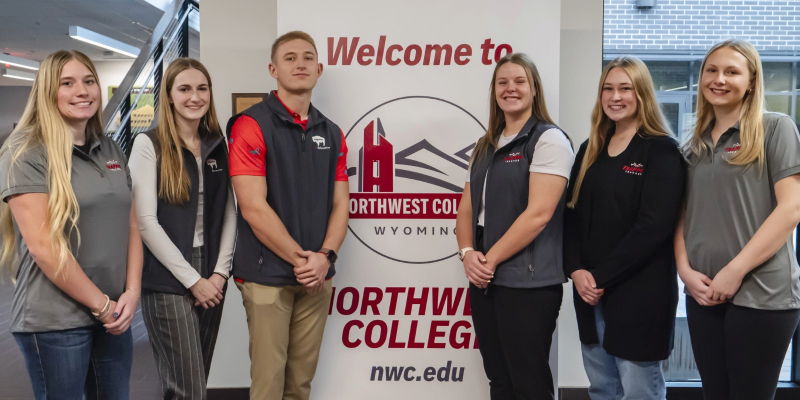003931
To be eligible to receive federal financial aid you must
- Have a high school diploma, high school equivalency certificate (GED, HiSET, TASC), or a home school certificate
- Be a matriculating student (be accepted for admission as a regular student in a degree program or select certificate program) offered by Northwest College. Contact the Financial Aid Office to determine if your intended program qualifies for financial aid.
- Be enrolled at least half time (Pell Grants are available to eligible students enrolled less than half time.) You must be at least half time to take out Student Loans, or be eligible for FSEOG or Work Study.
- Have a Social Security Number
- Be a U.S. citizen or national, or a permanent resident of the U.S. (eligible non-citizen)
- Be a citizen of the Freely Associated States: the Federated States of Micronesia and the Republics of Palau and the Marshall Islands; or be in the U.S. for other than a temporary purpose
- Have met the Standards of Satisfactory Academic Progress (SAP)
- Not receive aid from another institution for the same period of enrollment
- Not be in default or owe a repayment on any Title IV federal financial aid
For financial aid purposes, financial need is determined by the following formula:
How Eligibility is Calculated:
Cost of Attendance (COA)
- Student Aid Index (SAI)
Financial Need
Cost of Attendance (COA) is based on government guidelines and average costs. A COA for Pell Grant includes allowance for tuition and fees, room and board, books and supplies. COA for Campus-Based funds (Federal Supplemental Educational Opportunity Grant, Federal Work Study, & Direct Loans) include the above plus transportation and personal expenses. COA can only include costs of attendance for the student. Additional living allowances for married students or additional family members are not included in student budgets.
Not necessarily. Federal Pell Grant remains the same amount at all schools, based on your annual FAFSA application and enrollment status (full-time, 3/4-time, 1/2-time status). Other grants, loans, Federal Work-Study, and scholarships can vary based upon the school's cost of attendance, your enrollment status, your area of study/major, the amount of funds the college has available to award and your academic progress. You should explore all types of financial aid available to maximize your aid package. Additionally, review your enrollment selections to minimize costs (program cost, textbook purchases vs rentals, residence hall/meal plan selection, etc).
All scholarship awards (NWC and other) must be deducted from your Cost of Attendance (COA), a combination of direct billing (NWC tuition & fees, room & board, etc) and indirect expenses (transportation and personal expenses), based on your enrollment and residency status. Generally, student may not receive aid in excess of their COA. If your financial aid awards for the academic year exceed your Cost of Attendance, NWC scholarship funding may be reduced.
Outside scholarships may decrease the amount of student loan you qualify for. Also, If you are a Wyoming student with the Hathaway Scholarship, the amount of Hathaway may be decreased if your total aid package exceeds your COA.
Cost of Attendance (COA) is based on government guidelines and average costs. A COA for Pell Grant includes allowance for tuition and fees, room and board, books and supplies. COA for Campus-Based funds (Federal Supplemental Educational Opportunity Grant, Federal Work-Study, & Direct Loans) include the above plus transportation and personal expenses. COA can only include costs of attendance for the student. Additional living allowances for married students or additional family members are not included in student budgets.
The Student Aid Index (SAI) is an eligibility index number that the Northwest College Financial Aid Office uses to determine how much federal student aid you would receive if you attended the school. This number results from the information that you provide on your FAFSA form. This number is not a dollar amount of aid eligibility or what your family is expected to provide. A negative SAI indicates the student has a higher financial need. Northwest College will determine your financial need by subtracting your SAI from the cost of attendance. The 'FAFSA Simplification Act' replaced the Expected Family Contribution (EFC) with the SAI. If you do not believe your SAI accurately reflects your family's ability to pay for your education, due to a change in family or financial circumstances, contact the FAO.
The parent contribution is an estimate of the amount the parent can provide to assist a student during the academic year. The contribution could be in the form of a monthly amount for spending money, paying the student's car insurance, etc. The parent may apply for a Parent Loan for Undergraduate Students (PLUS Loan) if loan funds are needed to assist a student in paying for items in the COA (see previous question). Or, parents may contact or visit the Business Office to explore payment plan options. Payment plans can be arranged with Tuition Management Systems by calling 1-800-356-8329 or going on line to afford.com/northwestcollege. Additionally, review your enrollment selections to minimize costs (program costs, textbook purchases vs rentals, residence hall/meal plan selection, etc), but remember to discuss enrollment changes with the Financial Aid Office to determine if changes affect your aid.
Students whose applications are selected for verification will be required to submit certain documentation to the Northwest College Financial Aid Office. Taxable income and taxes paid are verified primarily when the student/parents use Option #1) is to submit an Federal IRS Tax Return Transcript and Option #2) is a signed copy of your federal tax return with applicable schedules . Please see our Federal Financial Aid Verification page on the Financial Aid section of the college website for specific details.
State returns are not needed.
In addition to good manners, a thank-you letter for a scholarship becomes a treasure for the donor. It is also an opportunity for the student to connect with a person who is passionate about supporting them and who may want to continue that support.
The content of your letter should:
- Start with an appropriate salutation (Dear Donors of the ________ Scholarship)
- Identify the name of the scholarship for which you’re expressing thanks
- Offer at least one or two sentences of personal information about you to help your donor better know you (your major dreams and goals, study focus, interests, hometown, high school activities)
- Express your gratitude for the gift
The form of your letter should:
- Be clearly legible if you handwrite a personal note or thank you card
- Loosely follow standard letter style (for printed letter), including date, salutation, paragraphs and signature
- Use formal English (don’t use texting language)
- Include your handwritten signature at the bottom (if handwritten)
When you’re finished:
- Ask someone to proofread your thank-you for correct grammar, punctuation, spelling, etc.
- Deliver your finished thank-you to the Financial Aid and Scholarships Office, or attach the thank you to an email and send to Scholarships@nwc.edu
- Scholarship funds are not released to students until the beginning of the semester and until the appropriate thank-you is received by the Financial Aid and Scholarships Office
Remember, your login to the scholarship application is the same as your login for your MyNWC College Portal. If you can remember your NWC ID, you can reset your password here. If you can not remember your NWC ID, you can call Admissions at 754-6101.
Visit https://irs.gov or call Toll-Free, 1-800-908-9946.
For local offices, visit the IRS website under Contact Your Local IRS Office:.
No. Financial aid is subject to change each year based on a variety of factors;
- FAFSA information and/or formula changes
- Student Aid Index (SAI) number from FAFSA
- Cost of attendance (COA) calculation
- Other types & amounts of aid or scholarships you are awarded
- Enrollment status changes
- Satisfactory academic progress standing
The FAFSA iis filed annually to accommodate annual changes in taxed and untaxed income, assets, family size and number in college/university. Most data elements are as of the date the FAFSA is filed, but income is taken from the previous calendar year. Should your family experience income changes between the calendar year used to file the FAFSA and the commencement of the FAFSA award year, contact the financial aid office at NWC to discuss a Special Consideration Appeal based on the specific changes.
Very likely. If you change your living arrangements (i.e., live with parents, move on-campus), change your enrollment status (i.e.,full-time to 1/2-time), change the number of credits in which you are registered, fail to begin attendance in a course or withdraw from or fail a class, your aid may be recalculated. Additionally, changes to your enrollment status may adversely affect your financial aid eligibility for your next semester of enrollment and/or next academic year if you fail to meet the Standards of Satisfactory Academic Progress (SAP) requirements. Check with the Office of Financial Aid & Scholarships before you make a change to determine if it will affect your aid.
Completing the financial aid process from beginning to end takes time. Each student's actual processing time will depend upon when you apply and how quickly you respond to requests from our office and the volume of students who have applied for aid. The process normally takes 12 to 16 weeks from completing the FAFSA to receiving an Offer Letter.
If you are eligible for financial aid, we will mail you an offer letter stating terms and conditions of aid programs for which you are eligible. The offer letter will tell you the estimated cost of attendance for the period of enrollment, the Student Aid Index (SAI) and the types and amounts of aid you are awarded. Carefully read the offer letter and all materials included. If you accept the award(s) offered (and you have the right to decline any award), sign one copy of the offer letter as directed and return it to the FAO. Retain the other copy for your records. If your enrollment status changes or if you change your program or housing status in any way, notify our office immediately so we can determine if your eligibility is affected. If your eligibility changes within an academic year, you may receive a revised offer letter advising you of the increase/decrease in funding.
Payment fees day is the first day of classes each semester. If you have not been awarded at this point or your aid is not enough to cover your costs visit the Business Office to explore payment plan options. Payment plans can be arranged with Tuition Management Systems by calling 1-800-356-8329 or going on line to afford.com/northwestcollege. Additionally, review your enrollment selections to minimize costs (program costs, textbook purchases vs rentals, residence hall/meal plan selection, etc.), but remember to discuss enrollment changes with the Financial Aid Office to determine if changes affect your aid.
You can see immediately your minimum Trapper Scholarship award by using the chart for Wyoming or out-of state students to determine your award level.
Off Campus
Many local businesses employ NWC students part-time. Contact the Academic & Career Advising Office for advice, read the Powell Tribune classifieds, and/or check with local employers online and in-person.
On Campus
You can review a listing of available Student Jobs. Be sure to check back through-out the semester as campus jobs open and close all
the time.
Both Federal and Institutional employment earnings are paid in monthly payments directly to the student employee, based on the hours worked during that pay period. You have discretion to use those funds as needed, including paying towards any outstanding account balances.
NWC pays all student employees at least the hourly federal minimum wage. Students can work a maximum of 20 hours per week, in all positions combined. Federal work study awards listed on award letters are not guaranteed earnings, but rather the maximum limit the student may earn from those funds.
Federal Work-Study and Student Employment are just like any other job. You may have to pay taxes on your earnings. You should estimate how much you will earn during the academic year and the summer and then complete the W-4 form so that you have the appropriate federal income taxes withheld if needed.
NWC does not automatically package federal student loans, so you may not see one on your award letter. If you indicate that you are interested in borrowing a student loan on the Financial Aid Office's Student Information Form, directions on how to apply are right there on the form (bottom of page 1). If you decide you need a loan after paper work has been turned in or after your initial award letter has been sent you can complete the following steps:
You can apply for your student loan online at https://studentaid.gov
Step 1: Complete the Master Promissory Note
Step 2: Complete loan Entrance Counseling
Step 3: Complete and return a Loan Request Form to the Financial Aid Office
*Note: If all steps are not completed a Federal Student Loan can't be processed.
Loan funds are credited directly to your student account. If you are a first-time borrower, the funds will be available to you 30 days after the first day of class. If you've borrowed previously at NWC and your file is complete and awarded (and your Master Promissory Note remains active), the funds will be available on the walk-in registration day. Additionally, if a loan is requested for only one semester of enrollment, funds will be disbursed in equal portions, one at the commencement of the semester and the 2nd disbursement at the midpoint of the semester. See Financial Aid Policies and Student Consumer Information or the reverse side of your award letter for more information.
For those that pursue student and/or parent loans, we remind you that there are repayment responsibilities regarding student loan debt. Please be cognizant of your loan balances, recognize the requirements and responsibilities surrounding loan debt,and make quality decisions regarding your debt burden. Routinely check with your lenders to ensure you remain in good standing. Remember, you can always access your federal loan information, repayment plan options, and/or find loan servicer information by visiting studentaid.gov for more information.
If you are determined to be ineligible for financial aid for reasons other than failing to meet the Standards of Satisfactory Academic Progress (SAP), contact the Financial Aid Office to discuss your ineligibility status. Occasionally an ineligibility determination may be due to an error in data recorded by the student on the FAFSA or the student having intended to change the program of study/major but failed to officially change programs within the Registrar's Office or similar circumstance. Please visit with the Financial Aid Office so we can determine if a FAFSA correction or a course of action is available to you to reinstate eligibility. Some paths to eligibility reinstatement may require a substantial length of time before eligibility is regained and not all ineligibility statuses will have solutions to reinstate eligibility.
If your question wasn't listed here, review the Financial Aid Office's Financial Aid Policies & Student Consumer Information found on the Financial Aid Policies page for comprehensive NWC financial aid information or contact the Financial Aid Office at:
Office: 104 Orendorff Bldg
Address: 231 W Sixth St Bldg 1
Powell, WY 82435
E-mail: financialaid@nwc.edu
Phone: 307.754.6158 or 1.800.560.4692, ext. 6158 (Toll Free)
Your Trapper Scholarship package is made up of individual privately funded scholarships. A Trapper Provider is one of these individual scholarships used to fund your NWC Trapper Scholarship. When you complete your scholarship application, you're automatically applied for most Trapper Providers. A few Trapper Providers require extra information from you. If you're eligible for these, you'll see a list of "Recommended Opportunities" when you finish the general application.
No. Think of your Trapper Scholarship as a package of Private Donor Scholarships. You may receive several Private Donor Scholarships, but they'll all come to you in a single Trapper Scholarship award.
Students receiving Athletic Scholarships (excluding Rodeo and Soccer) cannot accept Trapper Scholarships.


